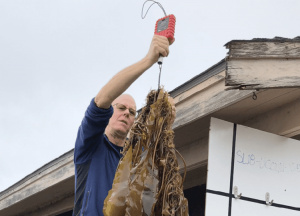With support from the Bezos Earth Fund, breeding study seeks to develop new strains

A leading U.S. ocean science research institution and a prominent international environmental NGO are teaming up to examine sugar kelp farming and how new strains could help the growing seaweed farming industry.
Over the next two and a half years, the Massachusetts-based Woods Hole Oceanographic Institution (WHOI) will conduct two breeding and harvesting seasons, starting this year, on commercial partners’ farms in the Northeast United States. By identifying different strains, they will match specific traits to meet targeted needs, such as taste and texture.
Partners will take part in breeding and nursery practices with the goal of amplifying and testing new kelp varieties jointly developed by WHOI and the University of Connecticut with funding from the U.S. Department of Energy. This research will be funded in part by World Wildlife Fund (WWF) and the Bezos Earth Fund.
“Much of this newfound interest is fueled by seaweeds’ climate-friendly qualities and the restorative properties associated with seaweed farms; absorbing excess carbon and nitrogen, buffering coastal pH, providing habitat and sheltering coastlines,” said Scott Lindell, a research specialist in aquaculture technology at WHOI.
https://www.aquaculturealliance.org/advocate/lean-and-green-whats-not-to-love-about-seaweed/
The study aims to examine genetic and environmental influences on kelp strains, compare traits of the strains (color, taste, shelf life) to meet the industry and consumer needs, and train hatchery operators on how to grow kelp seeds year-round.
Seaweed farming does not rely on fertile land, energy-intensive fertilizers or freshwater and, according to Lindell, it is easy to grow, beneficial for ocean ecosystems and an efficient, low-carbon way to produce nutritious food for both humans and animals. According to WHOI, seaweed represents 27 percent of annual global aquaculture production, in terms of tonnage.
“Seaweed farming produces highly nutritious foods with very few inputs relative to terrestrial farming, and it improves the quality of water in which the farms operate,” says WWF’s Paul Dobbins, senior director of impact investing and ecosystems services and seaweed lead. “The results of WHOI’s research will help farms advance their productivity, leading to greater environmental and societal gains. We are encouraged by the direction of this research and look forward to seeing progress over the next two growing seasons.”
Follow the Advocate on Twitter @GAA_Advocate
Now that you've finished reading the article ...
… we hope you’ll consider supporting our mission to document the evolution of the global aquaculture industry and share our vast network of contributors’ expansive knowledge every week.
By becoming a Global Seafood Alliance member, you’re ensuring that all of the pre-competitive work we do through member benefits, resources and events can continue. Individual membership costs just $50 a year. GSA individual and corporate members receive complimentary access to a series of GOAL virtual events beginning in April. Join now.
Not a GSA member? Join us.


